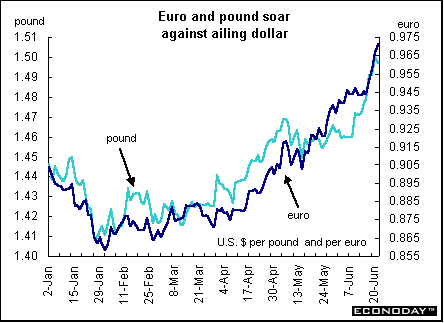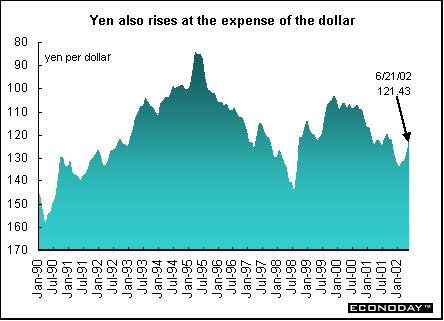CurrenciesThe dollar continues to sink, battered by weak stock markets and political uncertainties. U.S. economic data is generally ignored, especially if it is favorable. Disappointing data overseas is also ignored. The euro has risen about nine percent against the dollar this year, up almost four cents in the past month alone. The dollar also hit fresh yearly lows against the yen and sterling, the latter rising above $1.50 for the first time since the beginning of 2001. The darkest cloud hanging over the dollar remains the drooping stock market, which is persuading many international investors to take their money home. However, overseas indexes are sinking too.  The U.S. current account deficit mushroomed to a record $112.5 billion in the first quarter. This may mean that less money is being invested here or that more money is being siphoned out of the nation. The rise in the first quarter current account deficit was fuelled partly by a sharp fall in spending on U.S. shares by private foreign investors, reflecting concerns over the earnings prospects of U.S. corporations. A declining currency would have both positive and negative effects. It would help American manufacturers by making their products less expensive in foreign markets, thereby increasing exports. It would also allow U.S. manufacturers to recapture domestic sales as competing imports become more expensive. On the other hand, a steady fall in the dollar might put upward pressure on inflation, a result of higher import prices, and would also make foreign travel more expensive. If the fall in the dollar led foreign investors to stop putting their money into U.S. stocks and bonds — and there is already evidence of such a pullback — interest rates could rise and stock prices could fall further. Analysts believe the dollar's decline has been largely driven by concern that the United States is not bouncing back from last year's recession as strongly as first hoped. The yen rose this week despite the public disapproval of government officials and despite the precarious state of the economy. The appreciating yen could abort a Japanese recovery by making Japan’s exports more expensive and by cutting profits of exporters when they repatriate earnings home. However, when there is strong upward momentum in the currency, intervention, which has already been tried, doesn’t usually have the desired effect. On Friday, Finance Minister Masajuro Shiokawa boosted the yen against the dollar when he said that it is impossible to manipulate currencies. This was taken to mean that Japan was admitting defeat and that it could not use intervention to realign the yen. That would put Shiokawa at odds with other government officials, who continually rattle their sabers against the rising yen.  |